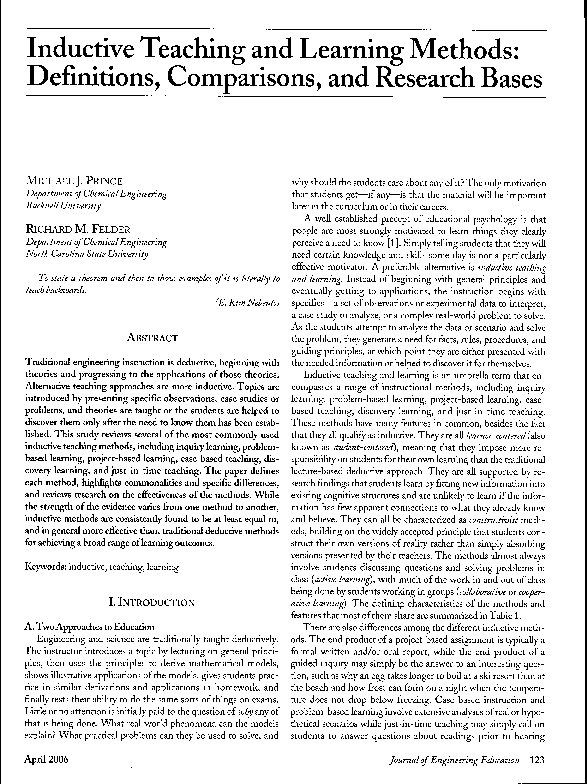
The Selection of a Research Approach Quantitative research methods participation in the information sciences papers in Croatia Dušan Munđar Faculty of Organization and Informatics University of Zagreb Pavlinska 2, 42000 Varaždin, Croatia dusan.mundjar@foi.hr Darko Matotek Faculty of Economics in Osijek University of Josip Juraj Strossmayer, Osijek Gajev trg 7, 31000 Osijek
(PDF) Recognising deductive process in qualitative research
Tools for data collection and analysis. AN ANALYSIS OF THE STRENGTHS AND LIMITATION OF QUALITATIVE AND QUANTITATIVE RESEARCH PARADIGMS Ochieng Pamela Atieno, 6. the process of qualitative research is inductive in that the researcher builds abstractions, concepts, hypotheses, and theories from details., a particular approach can influence how or where you disseminate your findings (e.g. publication). 3.1 Research Questions To take research questions first: Section 1 and Section 2 have already touched upon the kinds of questions that qualitative and quantitative research can address. Research questions are important because they guide the whole.
d Was the quantitative or qualitative approach adopted? d Was the research approach selected appropriate given the problem investigated and the goals of the research? d Was the process of investigation consistent with underlying assumptions of the research approach used? d Were appropriate types of conclusions drawn given the research Jan 20, 2008 · Most of the analytical approaches to qualitative research in health care are ‘generic’ and are not labelled within one of the specific traditions of qualitative research. A common approach in most of these studies is general and inductive in nature, but does not comply with the very systematic and rigorous inductive approach of grounded theory.
Recognising deductive process in qualitative research. Article (PDF Available) inductive approach to reasoning, the results of. A general inductive approach for analysis of qualitative evaluation data is described. The purposes for using an inductive approach are to (a) condense raw textual data into a brief, summary format; (b) establish clear links between the evaluation or research objectives and the summary findings derived from the raw data; and (c) develop a framework of the underlying structure of experiences or
Jan 30, 2011 · Definition of Deductive Qualitative Analysis A way of using theory from the beginning of research projects – As hypotheses to test and/or – Sensitizing concepts Theory-guided research Increasing numbers of researcher use theory upfront in qualitative research but there is no name for this 4. Quantitative research methods participation in the information sciences papers in Croatia Dušan Munđar Faculty of Organization and Informatics University of Zagreb Pavlinska 2, 42000 Varaždin, Croatia dusan.mundjar@foi.hr Darko Matotek Faculty of Economics in Osijek University of Josip Juraj Strossmayer, Osijek Gajev trg 7, 31000 Osijek
Inductive and Deductive Research •Inductive research begins with an observation and research question and leads to collection of empirical data, a hypothesis and a theory •Deductive research begins with a theory and hypothesis which guides data collection and analysis. 20 Independent variable Dependent Quantitative research methods participation in the information sciences papers in Croatia Dušan Munđar Faculty of Organization and Informatics University of Zagreb Pavlinska 2, 42000 Varaždin, Croatia dusan.mundjar@foi.hr Darko Matotek Faculty of Economics in Osijek University of Josip Juraj Strossmayer, Osijek Gajev trg 7, 31000 Osijek
The goal of descriptive research is to describe a phenomenon and its characteristics. This research is more concerned with what rather than how or why something has happened. Therefore, observation and survey tools are often used to gather data (Gall, Gall, & Borg, 2007). In such research, the data may be collected qualitatively, but it is Jan 30, 2011 · Definition of Deductive Qualitative Analysis A way of using theory from the beginning of research projects – As hypotheses to test and/or – Sensitizing concepts Theory-guided research Increasing numbers of researcher use theory upfront in qualitative research but there is no name for this 4.
The Strengths and Weaknesses of Research Methodology: Comparison and Complimentary between www.iosrjournals.org 100 Page A qualitative researcher also will design a study, collect data, analyze data and interpret data same like a quantitative researcher does. Qualitative research seeks to tell the story of a particular group’s experiences in their own words, and is therefore focused on narrative (while quantitative research focuses on numbers). The logic of qualitative research can be challenging for researchers more accustomed (as most of us are) to the traditional deductive approach.
Jan 20, 2008 · Most of the analytical approaches to qualitative research in health care are ‘generic’ and are not labelled within one of the specific traditions of qualitative research. A common approach in most of these studies is general and inductive in nature, but does not comply with the very systematic and rigorous inductive approach of grounded theory. Inductive reasoning works the other way, moving from specific observations to broader generalizations and theories. Informally, we sometimes call this a "bottom up" approach (please note that it's "bottom up" and not "bottoms up" which is the kind of thing the bartender says to customers when he's trying to close for the night!). In inductive
with things that matter, in ways that matter. Through qualitative research we can explore a wide array of dimensions of the social world, including the texture and weave of everyday life, the understandings, experiences and imaginings of our research participants, the ways that social processes, institutions, Research question should dictate the methodological approach used to conduct the research Qualitative research allows researchers to get at the inner experience of participants Determine how meanings are formed through and in culture Discover, rather than test variables Qualitative research is …
International Journal of Social Work and Human Services Practice Horizon Research Publishing Vol.4. No.4 September, 2016, pp. 75-81 An Introduction to the Grounded Theory Approach in Social Research Venkat Pulla Social Work Programme, Australian Catholic University, Australia Abstract This paper discusses Grounded theory, which is subsequent interpretation of these data, findings provide one Inductive and Deductive Research •Inductive research begins with an observation and research question and leads to collection of empirical data, a hypothesis and a theory •Deductive research begins with a theory and hypothesis which guides data collection and analysis. 20 Independent variable Dependent
Over the last forty years, case study research has undergone substantial methodological development. This evolution has resulted in a pragmatic, flexible research approach, capable of providing comprehensive in-depth understanding of a diverse range of issues across a number of disciplines. with things that matter, in ways that matter. Through qualitative research we can explore a wide array of dimensions of the social world, including the texture and weave of everyday life, the understandings, experiences and imaginings of our research participants, the ways that social processes, institutions,
Qualitative Research Approach Statistics Solutions

(PDF) Recognising deductive process in qualitative research. Designs. Research is usually undertaken to test a theory (deductive research) or to develop theory (inductive research). It is possible to use a qualitative approach as part of deductive research—for example, the use of individual or focus group interviews to refine hypotheses for testing., Jan 30, 2011 · Definition of Deductive Qualitative Analysis A way of using theory from the beginning of research projects – As hypotheses to test and/or – Sensitizing concepts Theory-guided research Increasing numbers of researcher use theory upfront in qualitative research but there is no name for this 4..
An Introduction to Deductive Qualitative Analysis

Tools for data collection and analysis. A general inductive approach for analysis of qualitative evaluation data is described. The purposes for using an inductive approach are to (a) condense raw textual data into a brief, summary format; (b) establish clear links between the evaluation or research objectives and the summary findings derived from the raw data; and (c) develop a framework of the underlying structure of experiences or https://en.wikipedia.org/wiki/Biographical_research studies display mixed results with some proposing that the inductive approach may be more advantageous than the deductive approach (Herron & Tomasello, 1992), others suggesting that the deductive approach is more successful (Robinson, 1996; Seliger, 1975), and the remainder making no distinction between the two approaches.

Qualitative research is a process of naturalistic inquiry that seeks in-depth understanding of social phenomena within their natural setting. It focuses on the "why" rather than the "what" of social phenomena and relies on the direct experiences of human beings as … Abstract: This article presents the case study as a type of qualitative research. Its aim is to give a detailed description of a case study – its definition, some classifications, and several advantages and disadvantages – in order to provide a better understanding of this widely used type of …
Jan 30, 2011 · Definition of Deductive Qualitative Analysis A way of using theory from the beginning of research projects – As hypotheses to test and/or – Sensitizing concepts Theory-guided research Increasing numbers of researcher use theory upfront in qualitative research but there is no name for this 4. Jan 20, 2008 · Most of the analytical approaches to qualitative research in health care are ‘generic’ and are not labelled within one of the specific traditions of qualitative research. A common approach in most of these studies is general and inductive in nature, but does not comply with the very systematic and rigorous inductive approach of grounded theory.
studies display mixed results with some proposing that the inductive approach may be more advantageous than the deductive approach (Herron & Tomasello, 1992), others suggesting that the deductive approach is more successful (Robinson, 1996; Seliger, 1975), and the remainder making no distinction between the two approaches AN ANALYSIS OF THE STRENGTHS AND LIMITATION OF QUALITATIVE AND QUANTITATIVE RESEARCH PARADIGMS Ochieng Pamela Atieno, 6. the process of qualitative research is inductive in that the researcher builds abstractions, concepts, hypotheses, and theories from details.
Compare and Contrast Inductive and Deductive Research Approaches By L. Karen Soiferman use of the inductive approach to research, the researcher begins with specific observations and measures, and then moves to detecting themes and patterns in the data. Inductive and Deductive Research Approaches , The goal of descriptive research is to describe a phenomenon and its characteristics. This research is more concerned with what rather than how or why something has happened. Therefore, observation and survey tools are often used to gather data (Gall, Gall, & Borg, 2007). In such research, the data may be collected qualitatively, but it is
Abstract: This article presents the case study as a type of qualitative research. Its aim is to give a detailed description of a case study – its definition, some classifications, and several advantages and disadvantages – in order to provide a better understanding of this widely used type of … Quantitative research methods participation in the information sciences papers in Croatia Dušan Munđar Faculty of Organization and Informatics University of Zagreb Pavlinska 2, 42000 Varaždin, Croatia dusan.mundjar@foi.hr Darko Matotek Faculty of Economics in Osijek University of Josip Juraj Strossmayer, Osijek Gajev trg 7, 31000 Osijek
Over the last forty years, case study research has undergone substantial methodological development. This evolution has resulted in a pragmatic, flexible research approach, capable of providing comprehensive in-depth understanding of a diverse range of issues across a number of disciplines. Qualitative research seeks to tell the story of a particular group’s experiences in their own words, and is therefore focused on narrative (while quantitative research focuses on numbers). The logic of qualitative research can be challenging for researchers more accustomed (as most of us are) to the traditional deductive approach.
CHAPTER 2 RESEARCH PHILOSOPHY AND QUALITATIVE INTERVIEWS 17 a time, holding the rest of the environment con-stant, statistically or experimentally. Whether results would hold in a more complex and vari-able environment is never certain. Naturalists take the opposite approach, examining how a variety of factors have interacted over time. They the research, the funders, and the positions and environments of the researchers themselves. Differences in the mix of these factors have led to numerous variations in approaches to qualitative research. Second, views on whether and how quality in qualitative research practice can
studies display mixed results with some proposing that the inductive approach may be more advantageous than the deductive approach (Herron & Tomasello, 1992), others suggesting that the deductive approach is more successful (Robinson, 1996; Seliger, 1975), and the remainder making no distinction between the two approaches the research, the funders, and the positions and environments of the researchers themselves. Differences in the mix of these factors have led to numerous variations in approaches to qualitative research. Second, views on whether and how quality in qualitative research practice can
Inductive Approaches and Some Examples. In an inductive approach Collect data, analyze patterns in the data, and then theorize from the data. to research, a researcher begins by collecting data that is relevant to his or her topic of interest. Once a substantial amount of data have been collected, the researcher will then take a breather from data collection, stepping back to get a bird’s International Journal of Social Work and Human Services Practice Horizon Research Publishing Vol.4. No.4 September, 2016, pp. 75-81 An Introduction to the Grounded Theory Approach in Social Research Venkat Pulla Social Work Programme, Australian Catholic University, Australia Abstract This paper discusses Grounded theory, which is subsequent interpretation of these data, findings provide one
Inductive and Deductive Research •Inductive research begins with an observation and research question and leads to collection of empirical data, a hypothesis and a theory •Deductive research begins with a theory and hypothesis which guides data collection and analysis. 20 Independent variable Dependent A general inductive approach for analysis of qualitative evaluation data is described. The purposes for using an inductive approach are to (a) condense raw textual data into a brief, summary format; (b) establish clear links between the evaluation or research objectives and the summary findings derived from the raw data; and (c) develop a framework of the underlying structure of experiences or
the research, the funders, and the positions and environments of the researchers themselves. Differences in the mix of these factors have led to numerous variations in approaches to qualitative research. Second, views on whether and how quality in qualitative research practice can International Journal of Computer and Information Technology (ISSN: 2279 – 0764) Volume 01– Issue 02, November 2012 www.ijcit.com 162 Using Inductive Approach as Research Strategy in
Qualitative Research Approach Statistics Solutions

Qualitative and descriptive В© The Author(s) 2015. Quantitative research methods participation in the information sciences papers in Croatia Dušan Munđar Faculty of Organization and Informatics University of Zagreb Pavlinska 2, 42000 Varaždin, Croatia dusan.mundjar@foi.hr Darko Matotek Faculty of Economics in Osijek University of Josip Juraj Strossmayer, Osijek Gajev trg 7, 31000 Osijek, Inductive Approaches and Some Examples. In an inductive approach Collect data, analyze patterns in the data, and then theorize from the data. to research, a researcher begins by collecting data that is relevant to his or her topic of interest. Once a substantial amount of data have been collected, the researcher will then take a breather from data collection, stepping back to get a bird’s.
Qualitative and descriptive В© The Author(s) 2015
An Introduction to Deductive Qualitative Analysis. Quantitative research methods participation in the information sciences papers in Croatia Dušan Munđar Faculty of Organization and Informatics University of Zagreb Pavlinska 2, 42000 Varaždin, Croatia dusan.mundjar@foi.hr Darko Matotek Faculty of Economics in Osijek University of Josip Juraj Strossmayer, Osijek Gajev trg 7, 31000 Osijek, International Journal of Education and Research Vol. 2 No. 7 July 2014 239 The Influence of Inductive-Deductive Approach Based on Modified Definition in Algebra Structure Learning Toward Student’s Proving Ability Viewed Based on College Entrance Track.
The Strengths and Weaknesses of Research Methodology: Comparison and Complimentary between www.iosrjournals.org 100 Page A qualitative researcher also will design a study, collect data, analyze data and interpret data same like a quantitative researcher does. Designs. Research is usually undertaken to test a theory (deductive research) or to develop theory (inductive research). It is possible to use a qualitative approach as part of deductive research—for example, the use of individual or focus group interviews to refine hypotheses for testing.
Jan 30, 2011 · Definition of Deductive Qualitative Analysis A way of using theory from the beginning of research projects – As hypotheses to test and/or – Sensitizing concepts Theory-guided research Increasing numbers of researcher use theory upfront in qualitative research but there is no name for this 4. A general inductive approach for analysis of qualitative evaluation data is described. The purposes for using an inductive approach are to (a) condense raw textual data into a brief, summary format; (b) establish clear links between the evaluation or research objectives and the summary findings derived from the raw data; and (c) develop a framework of the underlying structure of experiences or
Recognising deductive process in qualitative research. Article (PDF Available) inductive approach to reasoning, the results of. Mar 31, 2007 · tive research, explaining how it may be useful for exploring questions to do with “why” people do things rather than “how many” people do things (PJ, 17 March, p312). In part 2 we discuss two common methods of data collection: focus groups and in-depth in-terviews. An example of data analysis using the general inductive approach and content
CHAPTER 2 RESEARCH PHILOSOPHY AND QUALITATIVE INTERVIEWS 17 a time, holding the rest of the environment con-stant, statistically or experimentally. Whether results would hold in a more complex and vari-able environment is never certain. Naturalists take the opposite approach, examining how a variety of factors have interacted over time. They CHAPTER 2 RESEARCH PHILOSOPHY AND QUALITATIVE INTERVIEWS 17 a time, holding the rest of the environment con-stant, statistically or experimentally. Whether results would hold in a more complex and vari-able environment is never certain. Naturalists take the opposite approach, examining how a variety of factors have interacted over time. They
Inductive Research Approach Inductive reasoning works the other way, moving from specific observations to broader generalizations and theories. Informally, we sometimes call this a "bottom up" approach Conclusion is likely based on premises. Involves a degree of uncertainty Hill Climbing THEORY TENTATIVE HYPOTHESIS PATTERN OBSERVATION How to choose a research methodology? MSc Business Information Systems Project 1: Applying Research Methodologies Inductive approach: from specific to general ♦Make observations questionnaires, interviews, literature research Type of research: inductive, empirical 21 adapted from Thomas Hanne. MSc Business Information Systems
with things that matter, in ways that matter. Through qualitative research we can explore a wide array of dimensions of the social world, including the texture and weave of everyday life, the understandings, experiences and imaginings of our research participants, the ways that social processes, institutions, Jan 20, 2008 · Most of the analytical approaches to qualitative research in health care are ‘generic’ and are not labelled within one of the specific traditions of qualitative research. A common approach in most of these studies is general and inductive in nature, but does not comply with the very systematic and rigorous inductive approach of grounded theory.
The Strengths and Weaknesses of Research Methodology: Comparison and Complimentary between www.iosrjournals.org 100 Page A qualitative researcher also will design a study, collect data, analyze data and interpret data same like a quantitative researcher does. Quantitative research methods participation in the information sciences papers in Croatia Dušan Munđar Faculty of Organization and Informatics University of Zagreb Pavlinska 2, 42000 Varaždin, Croatia dusan.mundjar@foi.hr Darko Matotek Faculty of Economics in Osijek University of Josip Juraj Strossmayer, Osijek Gajev trg 7, 31000 Osijek
Designs. Research is usually undertaken to test a theory (deductive research) or to develop theory (inductive research). It is possible to use a qualitative approach as part of deductive research—for example, the use of individual or focus group interviews to refine hypotheses for testing. How to choose a research methodology? MSc Business Information Systems Project 1: Applying Research Methodologies Inductive approach: from specific to general ♦Make observations questionnaires, interviews, literature research Type of research: inductive, empirical 21 adapted from Thomas Hanne. MSc Business Information Systems
AN ANALYSIS OF THE STRENGTHS AND LIMITATION OF QUALITATIVE AND QUANTITATIVE RESEARCH PARADIGMS Ochieng Pamela Atieno, 6. the process of qualitative research is inductive in that the researcher builds abstractions, concepts, hypotheses, and theories from details. CHAPTER 2 RESEARCH PHILOSOPHY AND QUALITATIVE INTERVIEWS 17 a time, holding the rest of the environment con-stant, statistically or experimentally. Whether results would hold in a more complex and vari-able environment is never certain. Naturalists take the opposite approach, examining how a variety of factors have interacted over time. They
d Was the quantitative or qualitative approach adopted? d Was the research approach selected appropriate given the problem investigated and the goals of the research? d Was the process of investigation consistent with underlying assumptions of the research approach used? d Were appropriate types of conclusions drawn given the research Inductive and Deductive Research •Inductive research begins with an observation and research question and leads to collection of empirical data, a hypothesis and a theory •Deductive research begins with a theory and hypothesis which guides data collection and analysis. 20 Independent variable Dependent
Research Methods Qualitative Approach

(PDF) A General Inductive Approach for Analyzing. Inductive Research Approach Inductive reasoning works the other way, moving from specific observations to broader generalizations and theories. Informally, we sometimes call this a "bottom up" approach Conclusion is likely based on premises. Involves a degree of uncertainty Hill Climbing THEORY TENTATIVE HYPOTHESIS PATTERN OBSERVATION, Research question should dictate the methodological approach used to conduct the research Qualitative research allows researchers to get at the inner experience of participants Determine how meanings are formed through and in culture Discover, rather than test variables Qualitative research is ….
An Introduction to Deductive Qualitative Analysis

Qualitative Research and its Uses in Health Care. a particular approach can influence how or where you disseminate your findings (e.g. publication). 3.1 Research Questions To take research questions first: Section 1 and Section 2 have already touched upon the kinds of questions that qualitative and quantitative research can address. Research questions are important because they guide the whole https://en.wikipedia.org/wiki/Biographical_research Jan 30, 2011 · Definition of Deductive Qualitative Analysis A way of using theory from the beginning of research projects – As hypotheses to test and/or – Sensitizing concepts Theory-guided research Increasing numbers of researcher use theory upfront in qualitative research but there is no name for this 4..

Research question should dictate the methodological approach used to conduct the research Qualitative research allows researchers to get at the inner experience of participants Determine how meanings are formed through and in culture Discover, rather than test variables Qualitative research is … Mar 31, 2007 · tive research, explaining how it may be useful for exploring questions to do with “why” people do things rather than “how many” people do things (PJ, 17 March, p312). In part 2 we discuss two common methods of data collection: focus groups and in-depth in-terviews. An example of data analysis using the general inductive approach and content
Inductive and Deductive Research •Inductive research begins with an observation and research question and leads to collection of empirical data, a hypothesis and a theory •Deductive research begins with a theory and hypothesis which guides data collection and analysis. 20 Independent variable Dependent Abstract: This article presents the case study as a type of qualitative research. Its aim is to give a detailed description of a case study – its definition, some classifications, and several advantages and disadvantages – in order to provide a better understanding of this widely used type of …
Inductive and Deductive Research •Inductive research begins with an observation and research question and leads to collection of empirical data, a hypothesis and a theory •Deductive research begins with a theory and hypothesis which guides data collection and analysis. 20 Independent variable Dependent International Journal of Computer and Information Technology (ISSN: 2279 – 0764) Volume 01– Issue 02, November 2012 www.ijcit.com 162 Using Inductive Approach as Research Strategy in
Designs. Research is usually undertaken to test a theory (deductive research) or to develop theory (inductive research). It is possible to use a qualitative approach as part of deductive research—for example, the use of individual or focus group interviews to refine hypotheses for testing. Designs. Research is usually undertaken to test a theory (deductive research) or to develop theory (inductive research). It is possible to use a qualitative approach as part of deductive research—for example, the use of individual or focus group interviews to refine hypotheses for testing.
Qualitative research is a process of naturalistic inquiry that seeks in-depth understanding of social phenomena within their natural setting. It focuses on the "why" rather than the "what" of social phenomena and relies on the direct experiences of human beings as … Mar 31, 2007 · tive research, explaining how it may be useful for exploring questions to do with “why” people do things rather than “how many” people do things (PJ, 17 March, p312). In part 2 we discuss two common methods of data collection: focus groups and in-depth in-terviews. An example of data analysis using the general inductive approach and content
Qualitative research seeks to tell the story of a particular group’s experiences in their own words, and is therefore focused on narrative (while quantitative research focuses on numbers). The logic of qualitative research can be challenging for researchers more accustomed (as most of us are) to the traditional deductive approach. A General Inductive Approach for Analyzing Qualitative Evaluation Data Article (PDF Available) in American Journal of Evaluation 27(2):237-246 · June 2006 with 17,568 Reads How we measure 'reads'
a particular approach can influence how or where you disseminate your findings (e.g. publication). 3.1 Research Questions To take research questions first: Section 1 and Section 2 have already touched upon the kinds of questions that qualitative and quantitative research can address. Research questions are important because they guide the whole a particular approach can influence how or where you disseminate your findings (e.g. publication). 3.1 Research Questions To take research questions first: Section 1 and Section 2 have already touched upon the kinds of questions that qualitative and quantitative research can address. Research questions are important because they guide the whole
d Was the quantitative or qualitative approach adopted? d Was the research approach selected appropriate given the problem investigated and the goals of the research? d Was the process of investigation consistent with underlying assumptions of the research approach used? d Were appropriate types of conclusions drawn given the research The goal of descriptive research is to describe a phenomenon and its characteristics. This research is more concerned with what rather than how or why something has happened. Therefore, observation and survey tools are often used to gather data (Gall, Gall, & Borg, 2007). In such research, the data may be collected qualitatively, but it is
Inductive Research Approach Inductive reasoning works the other way, moving from specific observations to broader generalizations and theories. Informally, we sometimes call this a "bottom up" approach Conclusion is likely based on premises. Involves a degree of uncertainty Hill Climbing THEORY TENTATIVE HYPOTHESIS PATTERN OBSERVATION Over the last forty years, case study research has undergone substantial methodological development. This evolution has resulted in a pragmatic, flexible research approach, capable of providing comprehensive in-depth understanding of a diverse range of issues across a number of disciplines.
a particular approach can influence how or where you disseminate your findings (e.g. publication). 3.1 Research Questions To take research questions first: Section 1 and Section 2 have already touched upon the kinds of questions that qualitative and quantitative research can address. Research questions are important because they guide the whole Qualitative research is a process of naturalistic inquiry that seeks in-depth understanding of social phenomena within their natural setting. It focuses on the "why" rather than the "what" of social phenomena and relies on the direct experiences of human beings as …

A general inductive approach for analysis of qualitative evaluation data is described. The purposes for using an inductive approach are to (a) condense raw textual data into a brief, summary format; (b) establish clear links between the evaluation or research objectives and the summary findings derived from the raw data; and (c) develop a framework of the underlying structure of experiences or Sep 26, 2013 · MethodSpace is a multidimensional online network for the community of researchers, from students to professors, engaged in research methods. Sponsored by SAGE Publishing, a leading publisher of books and journals in research methods, the site is created for students and researchers to network and share research, resources and debates.


